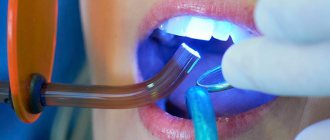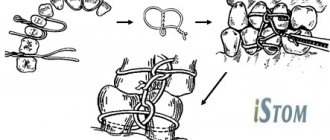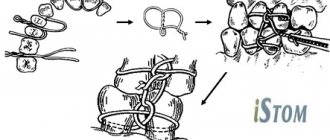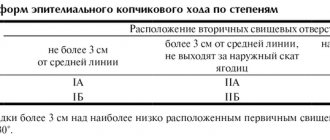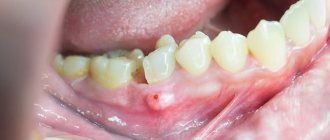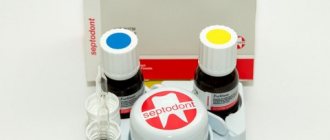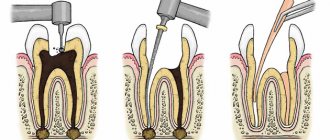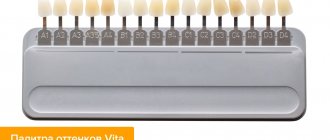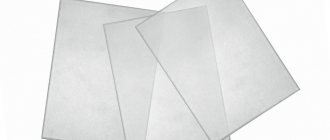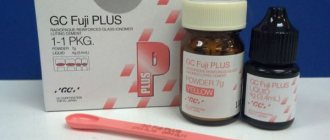Over time, teeth become fragile and begin to decay under the influence of various negative factors. In dentistry, special glass ionomers are used for their restoration and restoration, one of which is Cemion. This product allows you not only to restore the integrity of your teeth, but also to preserve their quality for a long period.
Cemion is a universal glass ionomer radiopaque filling cement. This product is chemically cured.
Cement is used to restore damaged teeth. Its main purpose is to completely replenish all the properties of lost dentin tissue as a result of destruction during carious lesions and other pathological processes.
Release forms and components
The material is produced in the form of glass ionomer cement, which has a chemical cure.
Cement has chemical adhesion to dentin and enamel. The process of formation of filling material occurs during the combination of powder and liquid, which are included in the kit. The structure of the powder is crushed aluminofluorosilicate glass. Liquid is an aqueous solution that is obtained from polyacrylic acid in a modified form.
On sale it is found in the form of a set of powder, solution, conditioner and topcoat. The powder has an A2 shade, its volume is 20 grams, the liquid volume is 20 ml, the conditioner is 10 ml, the protective coating varnish is 10 ml. Additionally, the kit includes a measuring cup, a dropper cap, applicators in the amount of 10 pieces, and a notebook for diluting cement.
Purpose:
Designed for fixing crowns, bridges and orthodontic structures, fixing inlays and pins.
Composition and main properties:
Glass ionomer cement "Cemion-F" is formed by mixing powder and liquid. The powder is crushed aluminofluorosilicate glass, the liquid is an aqueous solution of polyacrylic acid.
"Cemion-F" is radiopaque, has high mechanical strength, low solubility, good adhesion to enamel, dentin and basic structural dental materials. The material provides good marginal sealing and releases fluoride for a long time, which strengthens the hard tissues of the tooth and prevents the development of secondary caries.
Glass ionomer cement "Cemion-F" does not cause pain in the patient when fixing crowns and bridges.
Instructions for use:
Before using glass ionomer cement Cemion F, the jar of powder must be shaken well. The powder is dosed with a measuring spoon, the liquid is dosed with a dropper. It is recommended to mix powder and liquid in a weight ratio of 1.9:1, which corresponds to 1 scoop of powder without top (0.29 g) and 3 drops of liquid (0.15 g).
Glass ionomer cement Cemion F is mixed on glass with a plastic or metal spatula in portions for 30 seconds. At a temperature of +23+1 °C and a relative air humidity of 45-55%, the working time of cement is 2.5-3.0 minutes. As the temperature rises, the working time of cement is reduced; the material should be mixed on cooled glass. Hardening time in the mouth is 5-6 minutes.
Fixation is carried out using the generally accepted method. To improve the adhesion of cement to dentin, a tooth prepared for cementation is treated with a conditioner (applied with a brush or applicator for 15-20 seconds), then thoroughly washed with plenty of water and dried with air. Overdrying should be avoided. Treatment with conditioner is possible only on pulpless teeth, since during fixation significant hydraulic pressure is created and it is undesirable to have open dentinal tubules.
Excess cement is removed after 10-12 minutes. after fixation of dentures and orthodontic structures.
Along the lower border of the crown, it is necessary to apply a layer of Cemion topcoat varnish to protect the glass ionomer from exposure to the humid environment of the oral cavity during the first hour of its hardening.
Package:
Powder – 20 g
Liquid – 15 ml
Conditioner - 10 ml
Material properties
When mixing the powder with the liquid, a glass ionomer reaction occurs almost immediately. During the reaction, fluoride ions are released, which have a strengthening effect on the dentin structure. This product also has a disinfecting effect and prevents the occurrence of secondary carious lesions.
In addition, Cemion universal has other properties:
- the product is biologically compatible with the structure of dental tissues;
- has an increased level of strength up to 15 MPa;
- has increased resistance to acid erosion;
- when applied, creates a strong marginal seal;
- has radiopaque qualities.
Price
Cemion can be ordered online or at dental supply outlets. The price of Cemion F is 450-500 rubles. Cemion F is used when installing bridges, orthodontic structures, pins and inlays. It meets the rules of GOST R 51744-2001.
According to the VITA standard, several shades of cement powder are distinguished:
- Tsemion A2;
- Tsemion A3;
- AT 2;
- C2;
- C4.
The product does not cause pain in the patient.
Scope of application
This remedy is used in the following cases:
- for restoration of milk teeth (all classes of cavities);
- for filling open cavities with the first and second class, as well as sealing fissures;
- for filling cavities of the fifth class, but only if aesthetic factors are not considered the main ones;
- often used during the treatment of non-carious lesions of hard tissues, for example, to eliminate wedge-shaped defects and erosive lesions of enamel;
- used to install temporary fillings during long-term therapy;
- for restoration of damaged or destroyed tooth tissue under the crown;
- This product is used as a lining during fillings with composites and amalgam.
Action of Cemion
When the powder is mixed with a liquid, it exhibits a glass ionomer reaction. Dentin is strengthened thanks to fluoride ions, which have a cohesive effect. Glass ionomer cement Cemion is known for its disinfecting properties. It is a preventive material and prevents the development of secondary caries; this effect is achieved through prolonged exposure to fluoride. Means:
- compatible with tooth structure;
- has a strength of 15 MPa;
- resistant to acid erosion;
- fits firmly;
- has radiopaque properties.
Cemion ART (ART) is used to treat baby teeth, secure temporary fillings, and restore teeth under a crown. They eliminate wedge-shaped defects, enamel erosion, and fill open cavities of classes 1, 2 and 5. This is an excellent base for lining when filling with composites and amalgam.
Instructions for use
Since GIC is kept at low temperatures during transportation or storage, the material must be kept at room temperature for about an hour before it is used.
Before using the product, it is recommended to shake the jar of powder thoroughly.
Dosing of the powder is done using a measuring spoon, which is filled to the brim, the excess is removed with a special spatula. The liquid is dosed with a dropper, which is recommended to be kept in a strictly vertical position and at a height, this will ensure an even and correct fall of the drops.
Mixing cement is done on the surface of a notepad or glass. Mixing the material should be done with a plastic or metal spatula in portions every half a minute.
The glass ionomer can be used in two main variations.
To apply an insulation pad, you need to mix 1 scoop of powder, this is about 0.28 grams, with two drops of a solution of 0.1 grams. The hardening period is 2-2.5 minutes at 23 degrees Celsius. An increase in temperature causes a decrease in the working time of the material, so it is recommended to mix cement on the surface of cooled glass. Complete hardening of the product from the moment it is finished mixing takes 5-5.5 minutes.
To fill the fissures, two portions of powder are used, about 0.53 grams. About 3 drops of solution, 0.15 ml, are added to this amount of powder. The working period of the product lasts 1.5-2 minutes at 23 degrees Celsius. Elevated temperatures reduce the working period of the material, so its mixing is carried out on a cooled glass surface. The complete period of cement hardening from the moment of complete mixing is 3.5-4 minutes.
Before using the substance, the working cavity should be prepared according to general principles. The prepared cavity must be washed and dried with air.
After this, the cavity is treated with a conditioner, thereby increasing the adhesion properties of cement to the surface of hard tooth tissues. The conditioner is applied with a special brush or cotton swab for 15-20 seconds. After this, the work area is again rinsed with water and blown with air to dry.
The material can be used without gasket. But if deep voids in the dentin area, which is located close to the pulp, are being filled, then it is best to install a therapeutic type lining containing calcium hydroxide. The remaining area of dentin must remain open to ensure chemical bonding with Cemion.
The gasket should be applied before conditioning. If after conditioning the structure of the pad is damaged, then a new portion of the product is applied to restore it.
In the first hours after curing, the product is highly sensitive to moisture, for this reason a special protective varnish is applied to the surface of the cement, this is done using an applicator or a glass stick, then air-drying for 10-15 seconds.
After 15 minutes, the filling is processed and polished, this will allow the correct bite to be formed. The final grinding and polishing of the filling is performed no earlier than one day later. After this, the surface of the filling is again coated with protective varnish.
Storage conditions
The Cemion set should be placed in a dark place at a temperature from 5 degrees to 25. It is important to keep all jars with Cemion permanently sealed so that moisture does not get into them. If the storage rules are followed, the shelf life of the product is 2 years. If Cemion F VladMiVa will be transported in winter, at air temperatures below 0, before that it should be kept at room temperature for 24 hours.
Analogues are the German products “Ketak Molar ART”, “Espe”. And materials from other manufacturers: Argetsem, Vitremer, Kemfil Superior, Ketak Cem, Meron, Tsemfil 15.
Cemion cement greatly facilitates the dental practice. Its correct use, taking into account the pros and cons, provides wide opportunities in dentistry. This is one of the most effective means for fixing crowns and inlays.
special instructions
Dentists should adhere to the following guidelines when using glass ionomer:
- if the patient is allergic to the material, it is necessary to remove the substance and refuse its further use;
- during use, the solution should not be allowed to come into contact with the surface of the soft tissues of the oral cavity and skin; if this suddenly happens, the components should be washed off with water;
- If liquid or conditioner gets into your eyes, rinse them immediately with plenty of water and seek medical attention.
Precautionary measures
When using Cemion, doctors follow strict rules:
- They check whether the applicant has an individual intolerance to the drug. If it is discovered, they refuse to use it.
- Before processing the filling, the instruments are lubricated with Vaseline; no water is used.
- Apply Cemion carefully so that it does not get into the mouth or onto the skin around it. If such a situation occurs, quickly remove the component.
- If liquid or conditioner gets into your eyes, rinse them immediately with water.
- After using Cemion, immediately wash metal instruments under water or treat them with a disinfectant.
